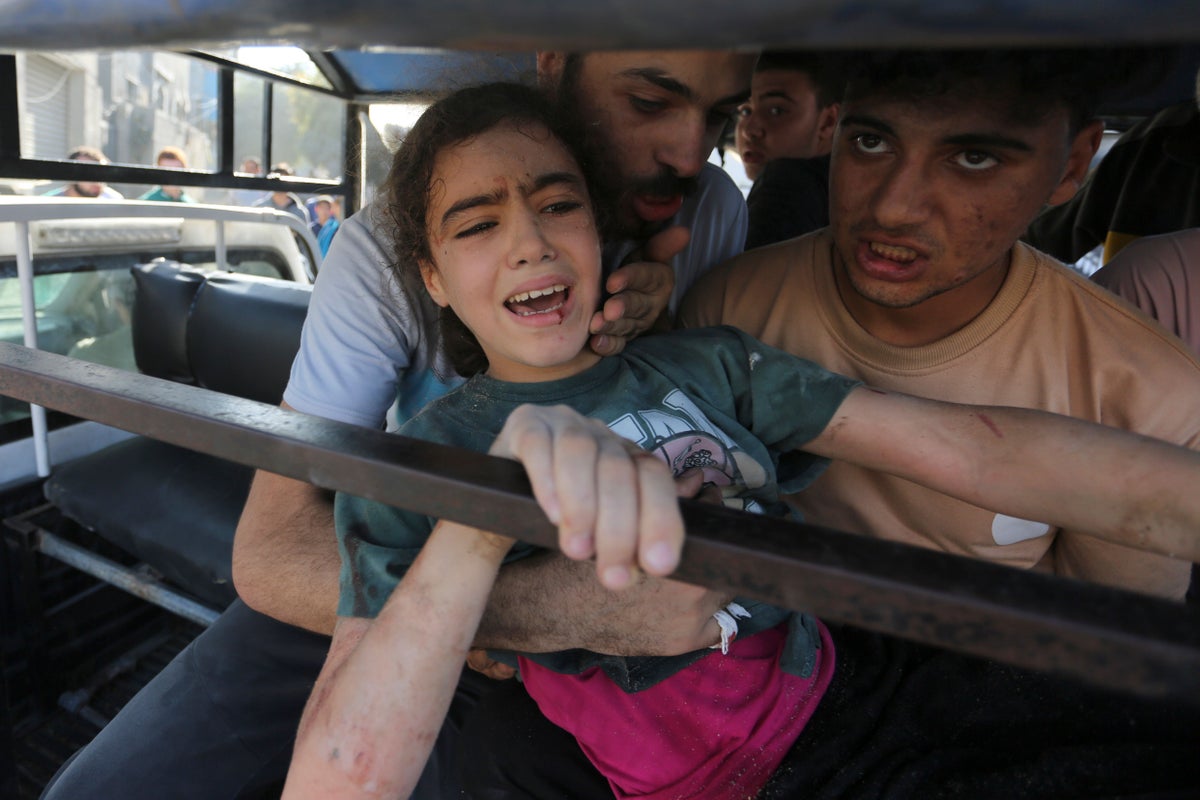
Rishi Sunak has called for temporary pauses in the conflict between Israel and Hamas to allow British nationals and hostages to be freed and for humanitarian aid to be provided in the Gaza Strip.
But the Prime Minister continued on Wednesday to reject calls for a longer ceasefire, with Downing Street arguing the move would “only serve to benefit Hamas”.
Mr Sunak said “specific pauses” are necessary for humanitarian purposes as Israel pummels the small strip of land, which is home to more than two million Palestinians.
He said such breaks had been discussed at the United Nations as he announced that an RAF plane is flying to Egypt with 21 tonnes of humanitarian supplies.
More than 80 MPs have urged the Government to call for a ceasefire, as five UK nationals remain missing, some of whom are believed to be hostages in Gaza.
Mhairi Black, the SNP’s deputy leader in the Commons, said Britain has a “human responsibility” to all civilians in Gaza but particularly to UK nationals who, she said, are in hospitals in the Gaza Strip with no food, no water, no medicine and “no way out”.
“How much worse does the situation have to get before he will join us in calls for a humanitarian ceasefire?” she asked at Prime Minister’s Questions.
Mr Sunak said “the first and most important principle is that Israel has the right to defend itself under international law” after Hamas’s atrocity on October 7.
“Our support for that position is absolute and unchanged,” he said.
“From the start we’ve also said that we do want British nationals to be able to leave Gaza, and we want for hostages to be released and for humanitarian aid to get in.
“We recognise for all of that to happen there has to be a safer environment which of course necessitates specific pauses as distinct from a ceasefire.”
Ms Black said joining calls for a ceasefire is the “best and maybe the only way to stop this conflict escalating beyond all control”.
But Mr Sunak said Israel has the “right to protect itself” after suffering a “shockingly brutal terrorist attack” by Hamas.
The Prime Minister’s official spokesman told journalists: “A wholesale ceasefire would only serve to benefit Hamas.
“Humanitarian pauses, which are temporary, which are limited in scope, can be an operational tool.”
Mr Sunak highlighted the need for fuel in the Gaza Strip, with No 10 saying it is essential for the desalination of water as well as for the transport of medication and running hospitals.
But the spokesman said ministers would want to prevent supplies being “misused in any way, shape or form” amid concerns they could be harnessed by Hamas to be used against Israel.
Defence Secretary Grant Shapps later backed a ground invasion by Israel “as long as the people that they are going after are the Hamas terrorists”.
But he told Sky News the group “hide themselves amongst” the Palestinian population and that the UK Government appreciates it is a “very difficult situation”.
Britain dispatched an RAF C-17 aircraft to Egypt from Brize Norton to deliver aid to Palestinian civilians.
The Egyptian Red Crescent was tasked with distributing the cargo of 76,800 wound care packs, 1,350 water filters and 2,560 solar lights.
Mr Sunak said: “Our team are on the ground ready to receive, we will continue to do everything we can do increase the flow of aid – including fuel – into Gaza.”
The Prime Minister has increased aid spending for civilians in the Occupied Palestinian Territories – Gaza and the West Bank – by £30 million to take the total this year to £57 million.
As part of Tel Aviv’s retaliation for Hamas’s raids that left 1,400 Israelis dead, it imposed a siege on the territory, blocking essentials such as water, food and fuel from entering.
Aid trucks have been permitted to reach Palestinians only in the past few days.
British aid charity Oxfam said starvation was being used “as a weapon of war” as it repeated its call for more aid to be allowed into the bombarded 25-mile strip.
The UN agency for Palestinian refugees has warned that without immediate deliveries of fuel it will soon have to sharply reduce relief operations for Gaza.
Health officials in the Hamas-ruled territory said on Wednesday that the death toll was soaring as Israeli jets continued striking the territory overnight.
The health ministry said more than 5,700 Palestinians have been killed in the conflict, including 2,300 children.
The Israeli military said its strikes had killed militants and destroyed tunnels, command centres, weapons storehouses and other military targets, which it has accused Hamas of hiding among the Gaza Strip’s civilian population.
The continuation of the battle between Tel Aviv and Hamas comes as a UK minister urged UN secretary-general Antonio Guterres to retract remarks that have sparked a diplomatic storm.
Mr Guterres told a UN Security Council meeting in New York on Tuesday that the “attacks by Hamas did not happen in a vacuum”, and had occurred after the Palestinian people had been “subjected to 56 years of suffocating occupation”.
The UN chief also expressed concern that “clear violations of international humanitarian law” had been committed by Israel during its fightback.
UK immigration minister Robert Jenrick, a close ally of Mr Sunak, said the comments were “wrong” and Mr Guterres should “retract that” if he was “implying there is any justification for” the killings by Palestinian militants.
The Conservative politician said it was “not for me to say” whether the UN chief should stand down after a call by Israel’s UN ambassador Gilad Erdan for Mr Guterres to resign.







